|
|
|
Sort Order |
|
|
|
Items / Page
|
|
|
|
|
|
|
| Srl | Item |
| 1 |
ID:
098456
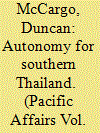

|
|
|
|
|
| Publication |
2010.
|
| Summary/Abstract |
Over 4000 people have died since 2004 in a violent conflict affecting Thailand's Malay-majority southern border provinces, Pattani, Yala, Narathiwat, and four districts of neighbouring Songkhla. Offering some form of autonomy or substantive decentralization to this troubled region might seem like an obvious response to the violence, but the topic has remained largely taboo until recently. Autonomy is seen by Bangkok in essentially pre-Cold War terms, as the thin end of the wedge, which could prefigure an unravelling of the unitary state crafted during the time of King Chulalongkorn. Nevertheless, in recent years a number of senior figures from different positions in Thai society have voiced support for alternative governance arrangements for the deep South. These have included Dr Prawase Wasi, one of the architects of the 1997 constitution, former prime minister Chavalit Yongchaiyudh, former interior minister Chalerm Yubamrung, and a number of academics. Their proposals range from full autonomy for the deep South to a national project of regionalization, as well as the creation of a new ministry to oversee the area. Prime Minister Abhisit Vejjajiva has offered mixed messages on the subject but has indicated sympathy for some form of decentralization. This article argues that despite the controversial nature of such proposals, there is a slowly emerging consensus around the need for a political solution to the conflict. In other words, Thailand is moving towards a post-Cold War understanding of autonomy as a means of preserving rather than undermining the nation state.
|
|
|
|
|
|
|
|
|
|
|
|
|
|
|
|
| 2 |
ID:
130188
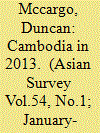

|
|
|
|
|
| Publication |
2014.
|
| Summary/Abstract |
Cambodia in 2013 was dominated by close-fought national elections on July 28, only narrowly won by the ruling Cambodian People's Party after an unexpectedly strong showing by the opposition. Generational change was a major theme of the year, seen in the growing activism of youth and the deaths of several prominent figures.
|
|
|
|
|
|
|
|
|
|
|
|
|
|
|
|
| 3 |
ID:
137917
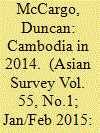

|
|
|
|
|
| Summary/Abstract |
During 2014, Cambodia moved from violent confrontation between government and opposition forces to an uneasy compromise. The turning point came in July, when opposition legislators agreed to take their seats in the National Assembly, which they had boycotted. The long-ruling Cambodian People’s Party worked to polish its tarnished image.
|
|
|
|
|
|
|
|
|
|
|
|
|
|
|
|
| 4 |
ID:
116379


|
|
|
|
|
| Publication |
2012.
|
| Summary/Abstract |
Thailand's monastic politics are in turmoil. No longer can the sangha be written off as a political force and viewed simply as a fount of legitimacy for the nation and the monarchy. The role played by a few hundred pro-Thaksin "redshirt" monks in the March to May 2010 mass demonstrations testified to growing unease within the rank-and-file monkhood, which is drawn from the same regions and segments of society as the redshirt movement more generally. But beyond these overt displays of dissatisfaction, the sangha faces a range of serious challenges. While long-standing tensions between the rival Thammayut and Mahanikai orders have apparently declined, a dearth of moral and administrative leadership has paralyzed the Thai monkhood and rendered it seemingly incapable of reforming itself. Competing power groups linked to secular politics are vying for influence within the Supreme Sangha Council, while there is no widely supported successor ready to replace the current supreme patriarch, himself nearly a hundred years old. In many respects, the political paralysis of the monkhood mirrors the wider crisis confronting the body politic of the Thai nation itself.
|
|
|
|
|
|
|
|
|
|
|
|
|
|
|
|
| 5 |
ID:
048035
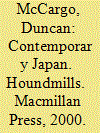

|
|
|
|
|
| Publication |
Houndmills, macmillan Press, 2000.
|
| Description |
xii, 223p.hbk
|
| Series |
Contemporary States and Societies
|
| Standard Number |
0333710022
|
|
|
|
|
|
|
|
|
|
|
|
Copies: C:1/I:0,R:0,Q:0
Circulation
| Accession# | Call# | Current Location | Status | Policy | Location |
| 042337 | 952/MCC 042337 | Main | On Shelf | General | |
|
|
|
|
| 6 |
ID:
052462
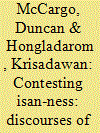

|
|
|
|
|
| Publication |
June 2004.
|
| Summary/Abstract |
This paper discusses the idea of Isan (Northeastern Thai) ethnoregional identity, and its relationship with two major alternative ideas: Thai identity and Lao identity. Drawing on ethnolinguistic research, the paper argues that Isan identity is a problematic political construct, reflecting ambiguous self-understandings and self-representations on the part of Northeasterners. Northeasterners are engaged in a negotiation process about their relationships with Thai and Lao identities, relationships fraught with cultural, social and political ramifications. The study suggests a more nuanced appreciation of the ambiguities of Isan identity than has yet been proposed.
|
|
|
|
|
|
|
|
|
|
|
|
|
|
|
|
| 7 |
ID:
095010
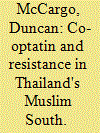

|
|
|
| 8 |
ID:
096597
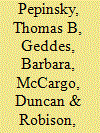

|
|
|
|
|
| Publication |
2010.
|
| Summary/Abstract |
Comparative politics has witnessed periodic debates between proponents of contextually sensitive area studies research and others who view such work as unscientific, noncumulative, or of limited relevance for advancing broader social science knowledge. In Southeast Asia in Political Science: Theory, Region, and Qualitative Analysis, edited by Erik Martinez Kuhonta, Dan Slater, and Tuong Vu, a group of bright, young Southeast Asianists argue that contextually sensitive research in Southeast Asia using qualitative research methods has made fundamental and lasting contributions to comparative politics. They challenge other Southeast Asianists to assert proudly the contributions that their work has made and urge the rest of the comparative politics discipline to take these contributions seriously. This symposium includes four short critical reviews of Southeast Asia in Political Science by political scientists representing diverse scholarly traditions. The reviews address both the methodological and the theoretical orientations of the book and are followed by a response from the editors.
|
|
|
|
|
|
|
|
|
|
|
|
|
|
|
|
| 9 |
ID:
178394
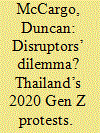

|
|
|
|
|
| Summary/Abstract |
This article offers a preliminary analysis of the hundreds of youth-inspired mass protests staged in Thailand during 2020. It argues that while calling for reforms and flirting with revolutionary rhetoric, the protestors lacked a clear programmatic agenda and were primarily engaged in disrupting dominant narratives about the country’s politics, especially in relation to the previously taboo question of the political role of the monarchy. Despite the ad hoc and sometimes incoherent nature of the protests, the students mounted a dramatic challenge to Thailand’s ruling elite. Ultimately, the conflict exemplified a generational divide: people from Generation Z, aged under 25, have radically different understandings of power, deference and legitimacy from older population groups. Whatever happens to the protest movement in the short term, the demonstrators have made a decisive break with the old social consensus that existed during the long reign of the late King Bhumibol (1946–2016).
|
|
|
|
|
|
|
|
|
|
|
|
|
|
|
|
| 10 |
ID:
089849
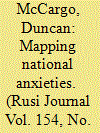

|
|
|
|
|
| Publication |
2009.
|
| Summary/Abstract |
The ongoing militancy in the Deep South of Thailand is more than a bout of separatist violence: it represents a cultural conflict that strikes at the heart of the Thai nation. Bangkok faces a serious legitimacy deficit in the region, but has failed to address disengagement from, and antipathy towards, the national myths and symbols that depict a country united by a single religion and an ageing monarch. Soothing the tensions will ultimately require a political solution. Duncan McCargo argues that the current insurgency marks a watershed moment: the time to act is now.
|
|
|
|
|
|
|
|
|
|
|
|
|
|
|
|
| 11 |
ID:
084356
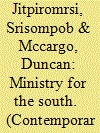

|
|
|
| 12 |
ID:
179936


|
|
|
|
|
| Summary/Abstract |
Since the publication of my article “Network monarchy and crises of legitimacy in Thailand” (Pacific Review, 2005), network monarchy has become an influential concept in the analysis of Thailand’s politics. Though widely adopted, the argument has also spawned rival or complementary coinings, ranging from “autonomous political networks” (Harris) to “working towards the monarchy” (Uenaldi), and the “deep state” (Merieau); as well as the “parallel state” and the “monarchized military” (Chambers and Napisa). This article revisits the argument, elaborates on the meanings of the original term and makes a case for network monarchy’s continuing salience in the Tenth Reign.
|
|
|
|
|
|
|
|
|
|
|
|
|
|
|
|
| 13 |
ID:
105448
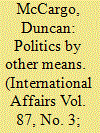

|
|
|
|
|
| Publication |
2011.
|
| Summary/Abstract |
This article argues that more emphasis should be placed on the political aspects of international tribunals, which are often in the business of reshaping politics as well as simply administering justice. By examining the hybrid Extraordinary Chambers in the Courts of Cambodia (ECCC), popularly known as the Khmer Rouge Tribunal, the article develops arguments previously advanced by Victor Peskin in respect of Rwanda and the former Yuogoslavia. Peskin has suggested that courtroom war crimes trials are paralleled by 'virtual trials', in which international and domestic political actors struggle for power and control over the form and outcome of proceedings. He terms these virtual trials 'trials of cooperation', in which governments of states where war crimes have been committed seek variously to help or hinder legal proceedings to address those crimes.
Such virtual trials now loom extremely large in the Cambodian case; the Hun Sen government, while exploiting the ECCC to deflect domestic and international attention from the endemic corruption and growing authoritarianism over which it presides, has sought tightly to limit the Tribunal's room for manoeuvre. One trial has been completed, another is about to start, and the international investigators and prosecutors are planning a couple more-but Prime Minister Hun Sen has personally declared his opposition to any further cases going ahead. If the ECCC succeeds in trying only five defendants from the murderous 1975-79 Khmer Rouge regime, justice will not have been done; and wider questions will emerge about the future viability of hybrid tribunals. The Cambodian case demonstrates that where war crimes tribunals are concerned, backroom 'virtual trials' need as much academic, policy and media attention as the actual courtroom trials of key defendants.
|
|
|
|
|
|
|
|
|
|
|
|
|
|
|
|
| 14 |
ID:
089369
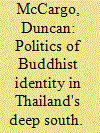

|
|
|
|
|
| Publication |
2009.
|
| Summary/Abstract |
This article sets out to criticise arguments by scholars such as Charles Keyes and Donald Swearer, who have framed their readings of Thai Buddhism through a lens of 'civic' or 'civil' religion. Drawing on fieldwork conducted in the southern border provinces, the paper argues that religious tolerance is declining in Thailand, and that anti-Muslim fears and sentiments are widespread among Buddhists. Some southern Buddhists are now arming themselves, and are creating militia groups in the face of growing communal violence. In the rest of Thailand, hostility towards Muslims, coupled with growing Buddhist chauvinism, is being fuelled by developments in the south.
|
|
|
|
|
|
|
|
|
|
|
|
|
|
|
|
| 15 |
ID:
096568
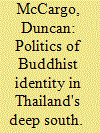

|
|
|
|
|
| Publication |
2009.
|
| Summary/Abstract |
This article sets out to criticise arguments by scholars such as Charles Keyes and Donald Swearer, who have framed their readings of Thai Buddhism through a lens of 'civic' or 'civil' religion. Drawing on fieldwork conducted in the southern border provinces, the paper argues that religious tolerance is declining in Thailand, and that anti-Muslim fears and sentiments are widespread among Buddhists. Some southern Buddhists are now arming themselves, and are creating militia groups in the face of growing communal violence. In the rest of Thailand, hostility towards Muslims, coupled with growing Buddhist chauvinism, is being fuelled by developments in the south.
|
|
|
|
|
|
|
|
|
|
|
|
|
|
|
|
| 16 |
ID:
097798
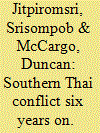

|
|
|
| 17 |
ID:
089368
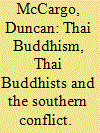

|
|
|
|
|
| Publication |
2009.
|
| Summary/Abstract |
Thailand's 'southern border provinces' of Pattani, Yala and Narathiwat - along with four districts of neighbouring Songkhla - are the site of fiery political violence characterised by daily killings. The area was historically a Malay sultanate, and was only loosely under Thai suzerainty until the early twentieth century. During the twentieth century there was periodic resistance to Bangkok's attempts to suppress local identity and to incorporate this largely Malay-speaking, Muslim-majority area into a predominantly Buddhist nation-state. This resistance proved most intense during the 1960s and 1970s, when various armed groups (notably PULO [Patani United Liberation Organization] and BRN [Barisan Revolusi Nasional]) waged war on the Thai state, primarily targeting government officials and the security forces. In the early 1980s, the Prem Tinsulanond government brokered a deal with these armed groups and proceeded to co-opt the Malay-Muslim elite. By crafting mutually beneficial governance, security and financial arrangements, the Thai state was able largely to placate local political demands.
|
|
|
|
|
|
|
|
|
|
|
|
|
|
|
|
| 18 |
ID:
096566
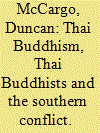

|
|
|
|
|
| Publication |
2009.
|
| Summary/Abstract |
Thailand's 'southern border provinces' of Pattani, Yala and Narathiwat - along with four districts of neighbouring Songkhla - are the site of fiery political violence characterised by daily killings. The area was historically a Malay sultanate, and was only loosely under Thai suzerainty until the early twentieth century. During the twentieth century there was periodic resistance to Bangkok's attempts to suppress local identity and to incorporate this largely Malay-speaking, Muslim-majority area into a predominantly Buddhist nation-state. This resistance proved most intense during the 1960s and 1970s, when various armed groups (notably PULO [Patani United Liberation Organization] and BRN [Barisan Revolusi Nasional]) waged war on the Thai state, primarily targeting government officials and the security forces. In the early 1980s, the Prem Tinsulanond government brokered a deal with these armed groups and proceeded to co-opt the Malay-Muslim elite. By crafting mutually beneficial governance, security and financial arrangements, the Thai state was able largely to placate local political demands.
|
|
|
|
|
|
|
|
|
|
|
|
|
|
|
|
| 19 |
ID:
152254
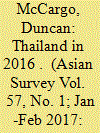

|
|
|
|
|
| Summary/Abstract |
Events in Thailand during 2016 were overshadowed by the death of long-reigning King Bhumibol Adulyadej on October 13, and the entire nation’s mourning. Despite the popular approval of a new constitution in August 2016, Thailand’s military regime showed no sign of relinquishing power during this time of considerable national anxiety.
|
|
|
|
|
|
|
|
|
|
|
|
|
|
|
|
| 20 |
ID:
160409


|
|
|
|
|
| Summary/Abstract |
Following the epochal funeral of the late King Bhumibol Adulyadej in October 2017, Thailand stands at a difficult crossroads. A new constitution was ratified in April, and the military junta is running out of reasons to stick around. Yet Thailand remains deeply polarized politically, while King Vajiralongkorn is untested and lacks popular legitimacy.
|
|
|
|
|
|
|
|
|
|
|
|
|
|
|
|
|
|
|
|
|